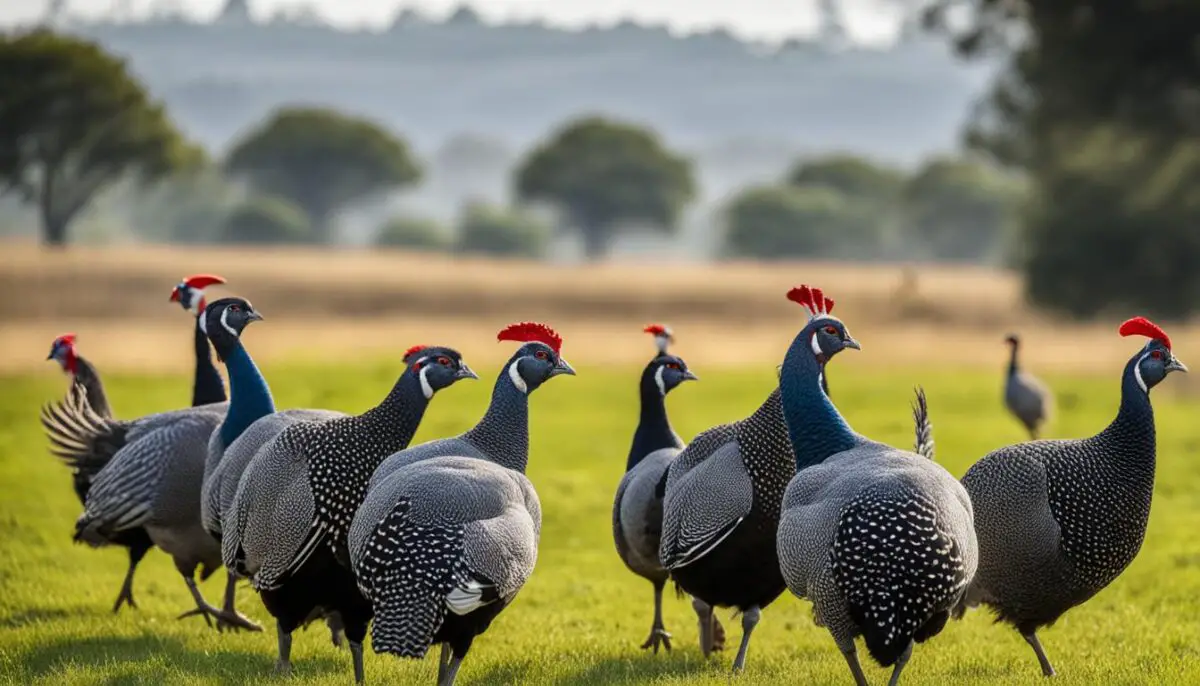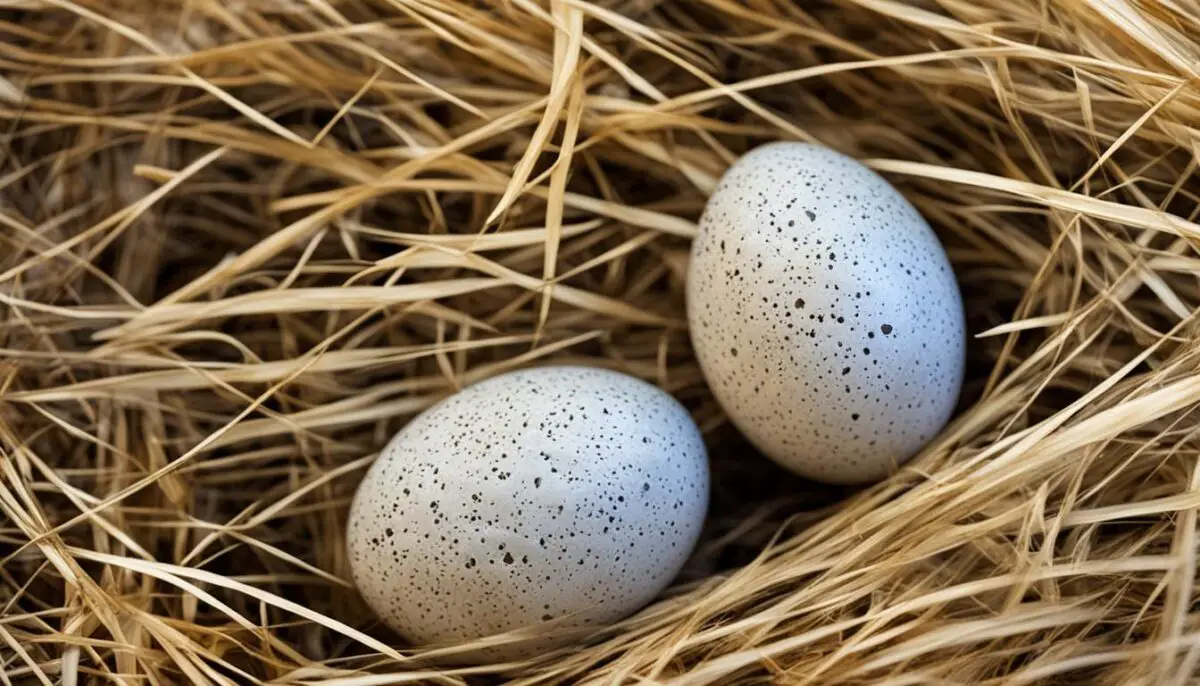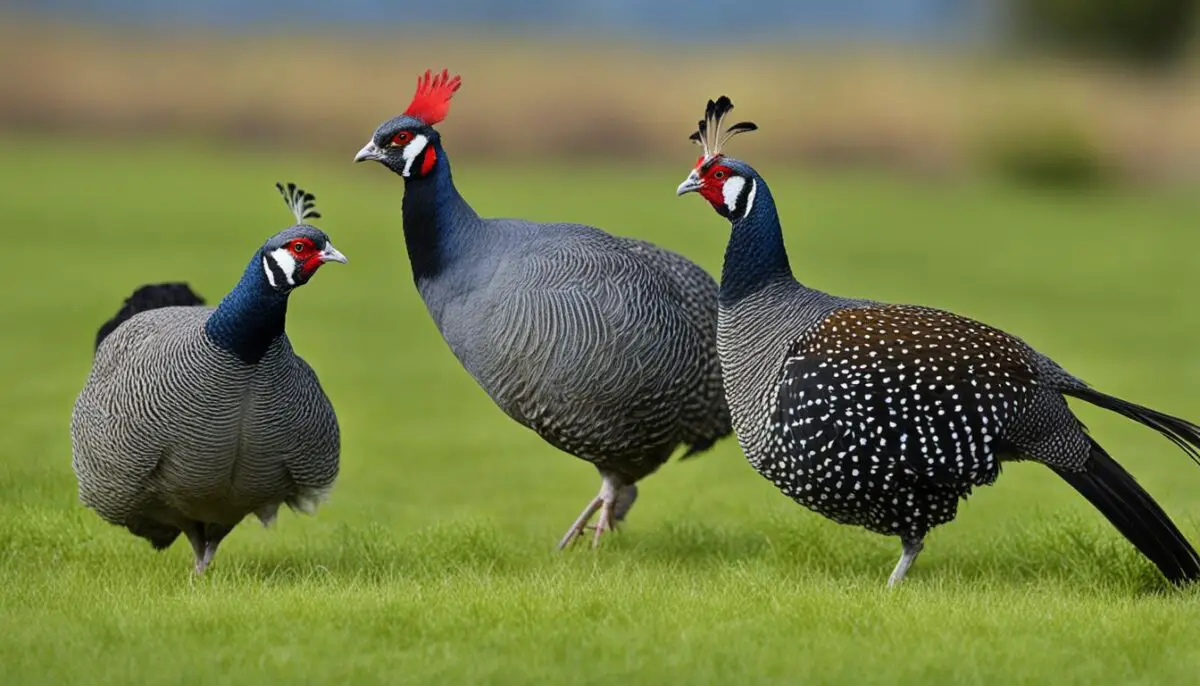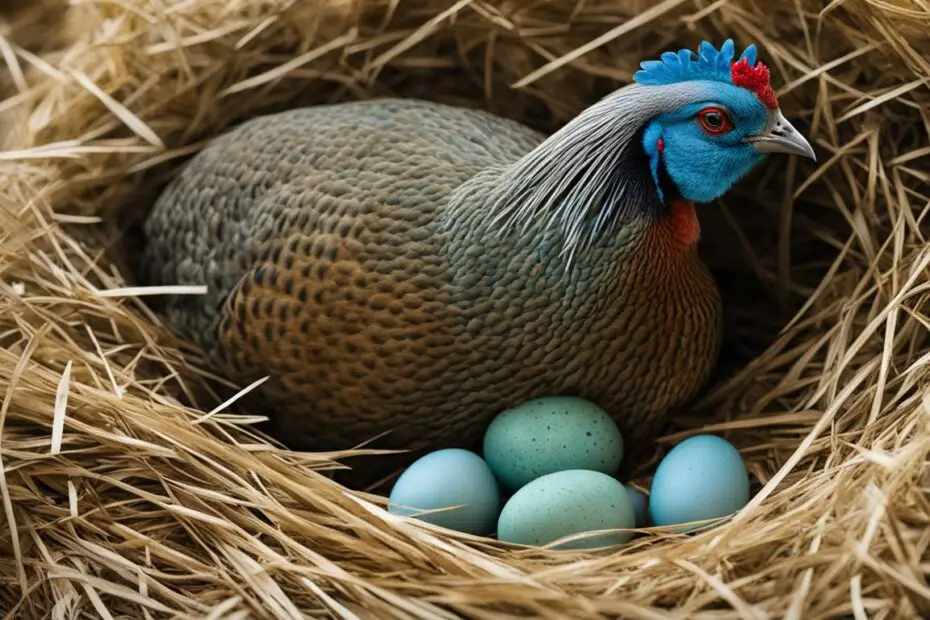Guinea fowl, also known as guinea hens, are unique birds that have gained popularity in backyard and homestead settings. They are known for their distinct personalities and their ability to eat pests and insects in the garden. One question that often arises is whether guinea hens lay eggs. The answer is a resounding yes! Guinea hens do lay eggs, and their egg-laying season typically begins around March or April, lasting until October. Under proper care and management, these fascinating birds can produce up to 100 or more eggs in a year.
Key Takeaways:
- Guinea hens are capable of laying eggs.
- Their egg-laying season usually starts in March or April and ends in October.
- Under proper care, guinea hens can produce over 100 eggs in a year.
- Guinea hen eggs are smaller than chicken eggs and have a thicker shell.
- Breeding hens will lay well for 2-3 years, and they tend to go broody after laying about 30 eggs.
Guinea Fowl Characteristics
Guinea fowl are fascinating birds with unique characteristics that distinguish them from other poultry species. Their distinct polka dot plumage and bald helmeted heads make them visually striking. However, it is their behavior that truly sets them apart.
These birds have a well-defined pecking order, which can result in aggression, particularly towards chickens and roosters. Guinea fowl are known for asserting their dominance within the flock, and conflicts may arise as they establish their place in the hierarchy.
Despite their assertive nature, guinea fowl are also highly independent creatures. They have a strong inclination to roam and fly, which can pose a challenge when trying to confine them to a specific area. However, this independence works to their advantage when it comes to controlling pests and insects in a larger outdoor space.
Guinea fowl possess a natural instinct for pest control and are renowned for their ability to rid gardens of unwanted insects. Their voracious appetite for pests such as mosquitoes, ticks, beetles, slugs, worms, caterpillars, and ants makes them valuable assets for those seeking a natural form of insect control.
Guinea Fowl Behavior
Understanding guinea fowl behavior is essential for successfully raising and managing these birds. In addition to their pecking order and independent nature, there are a few other notable aspects of guinea fowl behavior:
- Roaming and Foraging: Guinea fowl have a strong inclination to roam and explore their surroundings. They have excellent foraging skills and will actively search for food, including bugs and insects, in grassy areas.
- Alarms and Vocalizations: Guinea fowl have a distinctive call that serves as an effective alarm system. Their loud, raucous vocalizations can alert property owners to potential intruders or predators.
- Flight Capability: Unlike chickens, guinea fowl are proficient fliers and can cover significant distances when flying. Their wings allow them to escape potential threats or explore vast areas.

Guinea Fowl Pecking Order
The pecking order within a guinea fowl flock is a hierarchical system that determines social status and dominance. Established through various displays of aggression and submission, the pecking order helps maintain order and reduces the occurrence of internal conflicts.
It’s important to be aware of the pecking order dynamics when introducing new guinea fowl to an existing flock or integrating them with other poultry birds. Introducing new birds can disrupt the established order and may lead to aggressive behavior as the birds establish their rank within the group.
| Guinea Fowl Characteristics | Behavior | Pecking Order |
|---|---|---|
| Distinct polka dot plumage | Aggressive towards chickens and roosters | Hierarchical system |
| Bald helmeted heads | Independent and prone to roaming | Maintains order within the flock |
| Natural pest control abilities | Alarms and vocalizations | Helps reduce conflicts |
Guinea Hen Egg Production
Guinea hens have a unique egg-laying cycle. They will lay a clutch of 20-30 eggs in a hidden nest. Once they reach about 30 eggs, they may go broody and start incubating the eggs. During their laying season, which usually starts in March or April and ends in October, guinea hens can continue laying eggs, but their production may decrease as they go broody. It’s important to mark a few eggs in the clutch to ensure that the hen continues to lay in the same location.
Guinea hens tend to be good mothers, but they may not sit on the eggs until they all hatch.
“Guinea hens have a unique egg-laying cycle. They will lay a clutch of 20-30 eggs in a hidden nest.”
The incubation period for guinea hen eggs is about 26-28 days. This means that the guinea hen will sit on the eggs for this duration, ensuring the proper development of the embryos. It’s important to provide a safe and comfortable environment for the hen and her clutch during this time.

Benefits of Guinea Hen Eggs:
- Unique flavor profile with a higher yolk content
- Thicker and more durable shells, suitable for hard-boiling
- Versatile for use in various cooking methods
- Adds variety to culinary creations
Comparison: Guinea Hen Eggs vs. Chicken Eggs
| Egg Attribute | Guinea Hen Eggs | Chicken Eggs |
|---|---|---|
| Size | Smaller | Standard size |
| Weight | About 1.4 oz | About 2 oz |
| Shell Thickness | Thicker | Thinner |
| Yolk to White Ratio | Higher yolk content | Lower yolk content |
Insect Control and Other Benefits of Guinea Fowl
When it comes to keeping guinea fowl, one of the main advantages is their impressive ability to control pests and insects in the garden. These unique birds are voracious eaters and will eagerly consume a wide range of bugs, making them an effective natural form of pest control.
Guinea fowl have a diverse diet and can help keep your garden free from unwanted pests such as mosquitoes, ticks, beetles, slugs, worms, caterpillars, and ants. They are especially beneficial in reducing the population of rodents like mice and rats.
If you have concerns about intruders or predators, guinea fowl can also serve as a natural alarm system. Their alert nature and loud calls will warn you of any potential threats to your property.
Furthermore, guinea fowl are known for their ability to deter snakes. They can actively surround, harass, and even kill small snakes, making them excellent guardians of your outdoor space. Their presence can provide valuable reassurance for those worried about snake encounters.
However, it’s important to note that while guinea fowl are effective at controlling pests and deterring snakes, they may have a negative impact on beekeepers. Guinea fowl have been known to eat bees and may stand near beehives, posing a potential challenge for beekeepers looking to maintain their colonies.

| Benefit | Explanation |
|---|---|
| Pest and Insect Control | Guinea fowl are voracious eaters and can effectively reduce the population of pests including mosquitoes, ticks, beetles, slugs, worms, caterpillars, and ants. |
| Reduction of Rodents | Guinea fowl can help control the population of rodents like mice and rats, providing added protection for your outdoor space. |
| Natural Alarm System | The alert nature of guinea fowl and their loud calls make them an excellent natural alarm system, notifying you of any potential threats. |
| Deterrence of Snakes | Guinea fowl are known to actively deter snakes, surrounding, harassing, and even killing small snakes. |
| Caution for Beekeepers | Guinea fowl may eat bees and can pose a challenge for beekeepers looking to maintain their colonies. |
Keeping Guinea Fowl with Chickens and Other Considerations
Guinea fowl can be successfully kept alongside chickens, but it’s important to consider a few factors before integrating them into the same flock. Guinea fowl have a tendency to bully chickens, particularly roosters, which can disrupt the established pecking order within the chicken flock.
To mitigate any potential aggression or conflicts, it is recommended to provide separate coops and runs for guinea fowl and chickens. This allows each species to have their own space, reducing the likelihood of territorial disputes. Additionally, separate coops ensure that guinea fowl have a secure and appropriate environment to roost and lay their eggs.
“Keeping guinea fowl and chickens in separate coops and runs minimizes the risk of aggression and territorial disputes.”
It’s also crucial to provide guinea fowl with protection from predators. A well-secured, predator-proof coop is essential to keep guinea fowl safe from harm. Consider installing sturdy fences or wire mesh around their coop and run to prevent access from predators such as raccoons, foxes, and coyotes.
Before adding guinea fowl to your flock, it’s advisable to check local regulations and consult with your neighbors. Guinea fowl are known for their loud calls and independent nature, which may not be suitable for every backyard or neighborhood. Being considerate of your neighbors’ preferences and ensuring compliance with any local restrictions or ordinances can help foster positive relationships.
“Consulting with neighbors and being mindful of local regulations helps ensure a harmonious environment when keeping guinea fowl.”
To summarize, keeping guinea fowl with chickens is possible, but it requires careful consideration and planning. Separate coops, predator-proof enclosures, and open communication with neighbors are essential for a successful integration. With proper management and adequate provisions, guinea fowl and chickens can coexist harmoniously, creating a diverse and lively poultry flock.
Conclusion
In conclusion, guinea hens are not only unique and fascinating birds but also great additions to any backyard or homestead. Their ability to lay eggs, control pests, and serve as a natural alarm system offer a range of benefits for gardeners and property owners.
However, it’s important to consider a few factors before deciding to keep guinea fowl. Their loud calls and independent nature may not be suitable for every neighborhood or backyard. Additionally, their potential conflicts with chickens should be taken into account, as they may disrupt the pecking order within a mixed flock.
Overall, with proper care, management, and understanding of their specific needs, guinea hens can be a rewarding and entertaining addition to a poultry flock. Their unique characteristics, such as their distinctive polka dot plumage and bald helmeted heads, make them both interesting and challenging to keep.
So, if you’re ready to embark on the journey of raising guinea fowl, be prepared for a one-of-a-kind experience that offers the benefits of pest control, fresh eggs, and an entertaining presence in your backyard or homestead.
FAQ
Do guinea hens lay eggs?
Yes, guinea hens do lay eggs. They usually start laying eggs around March or April and can continue laying until October.
How many eggs do guinea hens lay?
Guinea hens can produce up to 100 or more eggs in a year, depending on their breeding cycle and broodiness.
What is the size of guinea hen eggs?
Guinea hen eggs are smaller than chicken eggs and have a weight of about 1.4 oz compared to the 2 oz of a chicken egg.
Do guinea hens go broody?
Yes, guinea hens tend to go broody after laying about 30 eggs. They may start incubating the eggs and become less focused on laying.
How long is the incubation period for guinea hen eggs?
The incubation period for guinea hen eggs is about 26-28 days.
What are the unique characteristics of guinea fowl?
Guinea fowl have a distinctive polka dot plumage, a bald helmeted head, and a tendency to be aggressive, especially towards chickens and roosters. They are also known for their independent and roaming nature.
Do guinea fowl eat pests and insects?
Yes, guinea fowl are voracious eaters and can consume a wide range of pests and insects, including mosquitoes, ticks, beetles, slugs, worms, and caterpillars.
Can guinea fowl serve as an alarm system?
Yes, guinea fowl can serve as a natural alarm system by warning you of intruders or predators. They are known to be effective in deterring snakes and can even surround, harass, and kill small snakes.
Can guinea fowl be kept with chickens?
Guinea fowl can be kept with chickens, but it’s important to consider their potential conflicts. Guinea fowl may bully chickens, disrupt the pecking order, and require separate coops and runs for each species.
What should be considered before keeping guinea fowl?
Before keeping guinea fowl, consider their loud calls, independent nature, and potential conflicts with neighbors. Ensure that you have appropriate space, a secure coop, and check local regulations.
Are guinea hens a valuable addition to a backyard or homestead?
Yes, guinea hens can be a valuable addition due to their ability to control pests and insects, serve as an alarm system, and their entertaining personalities. However, they require proper care, management, and understanding of their specific needs.

